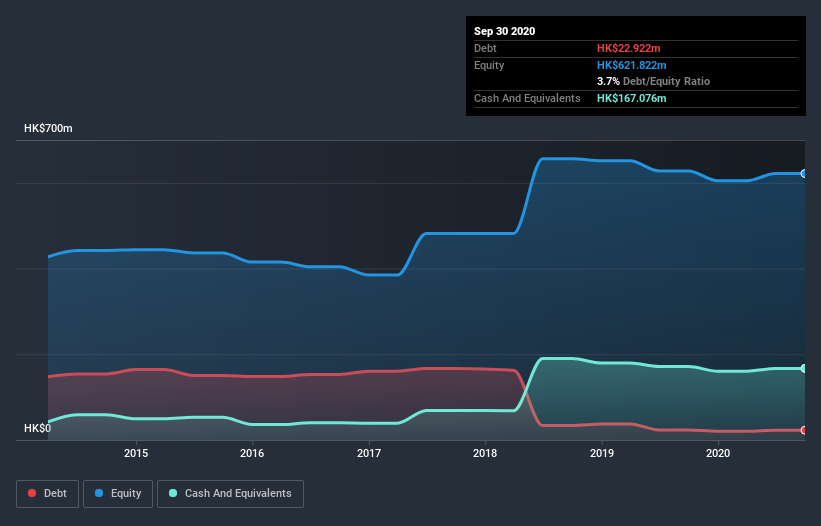- Hong Kong
- /
- Food and Staples Retail
- /
- SEHK:60
Health Check: How Prudently Does Hong Kong Food Investment Holdings (HKG:60) Use Debt?
Legendary fund manager Li Lu (who Charlie Munger backed) once said, 'The biggest investment risk is not the volatility of prices, but whether you will suffer a permanent loss of capital.' So it seems the smart money knows that debt - which is usually involved in bankruptcies - is a very important factor, when you assess how risky a company is. Importantly, Hong Kong Food Investment Holdings Limited (HKG:60) does carry debt. But is this debt a concern to shareholders?
What Risk Does Debt Bring?
Debt assists a business until the business has trouble paying it off, either with new capital or with free cash flow. In the worst case scenario, a company can go bankrupt if it cannot pay its creditors. However, a more common (but still painful) scenario is that it has to raise new equity capital at a low price, thus permanently diluting shareholders. By replacing dilution, though, debt can be an extremely good tool for businesses that need capital to invest in growth at high rates of return. The first thing to do when considering how much debt a business uses is to look at its cash and debt together.
View our latest analysis for Hong Kong Food Investment Holdings
What Is Hong Kong Food Investment Holdings's Net Debt?
The chart below, which you can click on for greater detail, shows that Hong Kong Food Investment Holdings had HK$22.9m in debt in September 2020; about the same as the year before. But it also has HK$167.1m in cash to offset that, meaning it has HK$144.2m net cash.

How Healthy Is Hong Kong Food Investment Holdings' Balance Sheet?
The latest balance sheet data shows that Hong Kong Food Investment Holdings had liabilities of HK$41.8m due within a year, and liabilities of HK$12.4m falling due after that. Offsetting this, it had HK$167.1m in cash and HK$10.7m in receivables that were due within 12 months. So it can boast HK$123.6m more liquid assets than total liabilities.
This surplus liquidity suggests that Hong Kong Food Investment Holdings' balance sheet could take a hit just as well as Homer Simpson's head can take a punch. On this view, lenders should feel as safe as the beloved of a black-belt karate master. Succinctly put, Hong Kong Food Investment Holdings boasts net cash, so it's fair to say it does not have a heavy debt load! There's no doubt that we learn most about debt from the balance sheet. But it is Hong Kong Food Investment Holdings's earnings that will influence how the balance sheet holds up in the future. So if you're keen to discover more about its earnings, it might be worth checking out this graph of its long term earnings trend.
Over 12 months, Hong Kong Food Investment Holdings made a loss at the EBIT level, and saw its revenue drop to HK$127m, which is a fall of 19%. We would much prefer see growth.
So How Risky Is Hong Kong Food Investment Holdings?
By their very nature companies that are losing money are more risky than those with a long history of profitability. And the fact is that over the last twelve months Hong Kong Food Investment Holdings lost money at the earnings before interest and tax (EBIT) line. And over the same period it saw negative free cash outflow of HK$12m and booked a HK$16m accounting loss. With only HK$144.2m on the balance sheet, it would appear that its going to need to raise capital again soon. Even though its balance sheet seems sufficiently liquid, debt always makes us a little nervous if a company doesn't produce free cash flow regularly. When analysing debt levels, the balance sheet is the obvious place to start. However, not all investment risk resides within the balance sheet - far from it. Consider for instance, the ever-present spectre of investment risk. We've identified 1 warning sign with Hong Kong Food Investment Holdings , and understanding them should be part of your investment process.
When all is said and done, sometimes its easier to focus on companies that don't even need debt. Readers can access a list of growth stocks with zero net debt 100% free, right now.
If you decide to trade Hong Kong Food Investment Holdings, use the lowest-cost* platform that is rated #1 Overall by Barron’s, Interactive Brokers. Trade stocks, options, futures, forex, bonds and funds on 135 markets, all from a single integrated account. Promoted
Valuation is complex, but we're here to simplify it.
Discover if Hong Kong Food Investment Holdings might be undervalued or overvalued with our detailed analysis, featuring fair value estimates, potential risks, dividends, insider trades, and its financial condition.
Access Free AnalysisThis article by Simply Wall St is general in nature. It does not constitute a recommendation to buy or sell any stock, and does not take account of your objectives, or your financial situation. We aim to bring you long-term focused analysis driven by fundamental data. Note that our analysis may not factor in the latest price-sensitive company announcements or qualitative material. Simply Wall St has no position in any stocks mentioned.
*Interactive Brokers Rated Lowest Cost Broker by StockBrokers.com Annual Online Review 2020
Have feedback on this article? Concerned about the content? Get in touch with us directly. Alternatively, email editorial-team (at) simplywallst.com.
About SEHK:60
Hong Kong Food Investment Holdings
An investment holding company, trades in frozen meats, seafood, and vegetables in Hong Kong and Japan.
Adequate balance sheet with very low risk.
Market Insights
Community Narratives


Recently Updated Narratives

Constellation Energy Dividends and Growth

CoreWeave's Revenue Expected to Rocket 77.88% in 5-Year Forecast

Bisalloy Steel Group will shine with a projected profit margin increase of 12.8%
Popular Narratives


MicroVision will explode future revenue by 380.37% with a vision towards success


NVDA: Expanding AI Demand Will Drive Major Data Center Investments Through 2026



